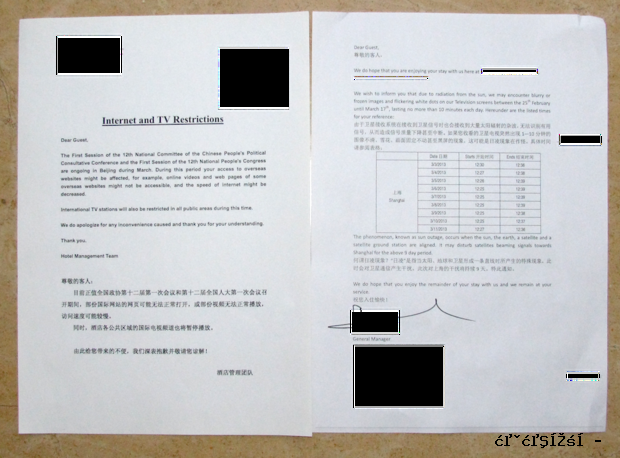《大西洋月刊》记者James Fallows最近在北京住了好几晚,他公布了一张酒店的互联网和电视限制通知。通知称,两会召开期间,部分国际网站的网页可能无法正常打开,或部分视频无法正常播放,访问速度可能较慢。
James Fallows引用一位了解防火墙的人士的话称,中国正在关注某个特定的流量加密协议,虽然中国试图将本国境内的互联网变成一个巨大的局域网,但它不可能屏蔽所有加密流量,因为这将会影响生意。所以中国选择随机检测和干扰有极高可能性属于非企业业务类型的加密流量。
Shanghai vs. Beijing, in One Image
MAR 7 2013, 8:35 AM ET
My wife and I have spent the past several nights at a hotel in Beijing, and we’ve just arrived at one in Shanghai. Both of the hotels are very nice and welcoming, and on check-in each of them provided a special notice about communication problems guests might encounter during their stay. Here are the notices side-by-side. You probably can’t read the tiny print, but there is an explanation below.

On the right, the notice in Shanghai: Because of sunspot and sun flare activity from late February through mid March, TV reception will be spotty during predictable brief intervals. For instance, today the interference was predicted between 12:25 and 12:39 China time.
On the left, the notice in Beijing: Because of the “twin meetings” of China’s main political bodies this week and next, Internet service will be slow or blocked altogether, online web and video may not be available, and “international TV stations will also be restricted in all public areas during this time.”
Two pieces of paper, two of the mentalities and forces at work in this moment’s China. One of them is open, except as constrained by forces of the cosmos. The other is defensive and reflexively closed-down. I won’t go on and spell out the implications, but this juxtaposition was too neat to resist.
On the general subject of closed-mindedness, I got this answer from a technical-virtuoso reader who is very closely involved in how the Chinese “Great Firewall” works:
Encrypted traffic, especially [a certain protocol] is being focused on. China operates like one big LAN as best they can muster. If they outright block all encrypted traffic they go off the grid and no one is willing to do business there. Their choice? Randomly detect and disrupt encrypted traffic that has a high probability of being non-business traffic. If I were them, I would also be “white-listing” corporate data streams.
So, China is like a company with an IT director bent on stopping anything but official corporate business from being conducted on their network. That’s the way to think of it…. China is doing nothing to [foreign] servers directly, but is disrupting the protocols they all use.
Thousands of users can connect to VPNs with no issue in China, so it definitely varies regionally and by ISP.
It’s fun to be back in Shanghai. And if you’re at the M on the Bund Shanghai Literary Festival tomorrow (Friday), please be sure to see Deborah Fallows at noon. I’ll be there on Sunday.
======
JAMES FALLOWS – James Fallows is a national correspondent for The Atlantic and has written for the magazine since the late 1970s. He has reported extensively from outside the United States, and once worked as President Carter’s chief speechwriter. His latest book, China Airborne, was published in early May.